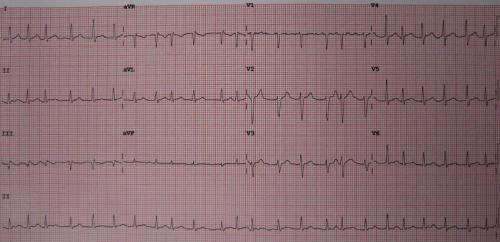by University of California, Los Angeles

A 12 lead ECG showing atrial fibrillation at approximately 150 beats per minute. Credit: James Heilman, MD/Wikipedia/CC BY-SA 3.0
Direct-acting oral anticoagulants such as apixaban are the most widely used medications of this type in people with atrial fibrillation, yet 26% to 45% of people fail to properly adhere to them.
Researchers interviewed 42 UCLA and UCSF adults with atrial fibrillation who had been prescribed apixaban between August 2019 and July 2020 but had reported nonadherence to the medication. Of those people, 83% stopped, skipped or decreased dosing and 17% percent never took the medication.
People with atrial fibrillation, or irregular heartbeat, who were prescribed the direct-acting oral anticoagulant apixaban cited six reasons for failing to adhere to their prescriptions:
- Cost—some felt that the out-of-pocket cost was too high, physicians were not helpful in addressing their cost concerns, or physician-provided coupons did not work
- Bleeding—some people worried about major or minor bleeding, including during activities such as hiking or construction work
- Lack of Symptoms—some believed that they did not need to take the medication if they did not experience symptoms or the symptoms were periodic, with some believing their stroke risk was small.
- Safe to skip doses—some believed the medication was still effective when they reduced doses from twice daily to once, and others believed that their physician gave tacit approval to occasional nonadherence when told to stop taking the medication a few days before surgery or if they experienced excess bleeding.
- Confusion about effects—some believed that the medication was intended to reduce atrial fibrillation symptoms and were puzzled when they continued experiencing them, or felt few effects from it and wanted measurable lab results.
- Incomplete or discordant communication—some did not tell their physician about their nonadherence, or said they were not asked about it, and others were confused by differing physician opinions.
The findings are useful in devising strategies to increase adherence to the medication.
The study was published in the Journal of the American Geriatrics Society.

Leave a Reply